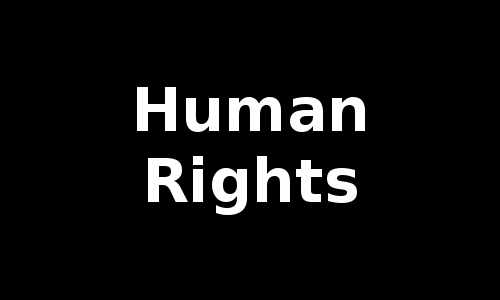What Should be the U.S. Policy on Human Rights?

In a new survey nearly two-thirds of Americans say human rights should be a central feature of U.S. foreign policy.
When it comes to the United States being the “world’s policeman” there are certain things that can trigger the U.S. getting involved in another country. In the not-too-distant past, the stories about what might be occurring inside another country were just that – stories.
But now, with people constantly carrying cameras and video recorders with them on their cell phones, the atrocities that occur around the world are able to be shared almost immediately with complete strangers on the other side of the globe, thanks to social media.
These videos and pictures can now be the impetus for Americans clamoring for the U.S. to be more involved to help stop these issues.
[ Also Read: BJP to Muslims: When in India, Do as the Hindus Do ]
Almost two-thirds of Americans (64%) say that human rights should be a central feature of the United States’ foreign policy. Just over one in ten (14%) say human rights should not be a central feature of foreign policy for the U.S. while almost one-quarter (22%) are not at all sure.
Men are more likely than women to say human rights should not be a central feature of U.S. foreign policy (20% vs. 9%) while women are more likely than men to be unsure (27% vs. 17%).
As might be expected, when it comes to foreign policy there is a partisan difference. Three-quarters of Democrats (76%) believe human rights should be a central feature of foreign policy, compared to three in five Independents (60%) and just over half of Republicans (55%).
[ Also Read: President Obama Makes a Surprise Trip in Afghanistan ]
One in five Republicans (20%) and 16% of Independents believe it should not be, compared to one in ten Democrats (9%).
When it comes to which countries or regions the U.S. government should speak out about human rights abuses, there isn’t one that rises to the top over any others. Almost two-thirds of Americans say the U.S. government is right to speak out about possible human rights abuses in the Middle East (64%) and in Sub-Saharan Africa (64%).
Three in five U.S. adults say the government is right to speak out about possible human rights abuses in Russia (61%) and China (61%).
[ Also Read: Russia Reacts with Sanctions against the West ]
Around one in five Americans say the U.S. government is not right to speak out about possible human rights abuses in the Middle East (18%), Sub-Saharan Africa (17%), Russia (20%) and China (20%), while roughly another one in five is not at all sure for each country or region (18% for the Middle East, 19% for Sub-Saharan Africa, Russia and China).
Interestingly, according to the survey, men are more likely than women to say that the U.S. government is right to speak out about possible human rights abuses in the Middle East (69% vs. 60%) and Sub-Saharan Africa (71% vs. 58%), as well as in Russia and China (66% vs. 56% for each country).
[ Also Read: Jews for Jesus Film: That Jew Died for You ]
Politically, again Democrats are more likely than Republicans and Independents to say the U.S. government is right to speak out against possible human rights abuses in each of these countries and/or regions.
But, the biggest gap is with regard to human rights abuses in Russia. Over half of Republicans (55%) and three in five Independents (60%) say the U.S. government is right to speak out, compared to seven in ten Democrats (70%).
These are some of the results of The Harris Poll of 2,286 U.S. adults surveyed online between May 14 and 19, 2014. The survey findings were released today, June 3.
On Feb. 3, 2014, Nielsen acquired Harris Interactive and The Harris Poll. Nielsen Holdings N.V. (NYSE: NLSN) is a global information and measurement company. Nielsen has a presence in approximately 100 countries, with headquarters in New York, USA and Diemen, the Netherlands.
💛 Support Independent Journalism
If you find RMN News useful, please consider supporting us.




